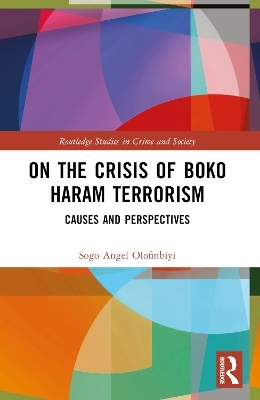
On the Crisis of Boko Haram Terrorism
Routledge (Verlag)
978-1-032-49441-8 (ISBN)
- Lieferbar (Termin unbekannt)
- Versandkostenfrei innerhalb Deutschlands
- Auch auf Rechnung
- Verfügbarkeit in der Filiale vor Ort prüfen
- Artikel merken
Rather than follow the popular notion of religion as the root causes of Boko Haram crisis, the book widens its scope to cover terrorism as a whole with a view to laying a more viable foundation for its readers to understand the concept of terrorism, provoking causes and perspectives, as well as influential factors that may interplay to sustain extremist terrorism in contemporary global society. Using Boko Haram as a potentially useful model, the book contends that the discursive framework of terrorism cannot be isolated from its socio-economic perspectives. In view of the foregoing, the simplistic response to resolving terrorism crisis in Nigeria still lies at the heart of ameliorating the socio-economic conditions of the citizens via the political state.
The book will be appropriate for individuals whose interests are vested on terrorism and homeland security, terrorism and counterterrorism studies, criminal justice and organized crime, terrorism and political violence, African politics, peace and conflict resolution as well as security and conflict management. Counter-terrorism experts, policy makers, academic scholars, intelligence and security operatives will also find this book resourceful. Ultimately, as interest in terrorism studies continues to grow exponentially among Sociologists, Anthropologists and Criminologists, it is my utmost quest to provide the most invaluable themes and updated theories in terrorism research for use by independent researchers, students and academics seeking to advance empirically and theoretically driven research in the fields of terrorism, homeland security and related crimes.
Sogo Angel Olofinbiyi is a Senior Lecturer in the Department of Criminal Justice, School of Law, at the University of Venda, South Africa. He received his B.Sc. in Biological and Cultural Anthropology and M.Sc. in Sociology (Crime and Delinquency) from the University of Ibadan and University of Lagos respectively; and his PhD in Criminology and Forensic Studies from the University of KwaZulu-Natal, South Africa. He is a South African National Research Foundation (NRF-Rated) Scholar and a life member of the International Criminology Association, International Society of Criminology, Canadian Criminal Justice Association, as well as Criminological and Victimological Society of Southern Africa. His research interests currently focus on a broad range of specializations encompassing terrorism and violence, crime and racism, biopsychosocial context of criminal behaviour, crime scene investigation, criminological theories, crime & deviance (with a particular focus on cybercrime, drug use, rape and prostitution), youth and adolescent delinquent behaviour and related offenses. He has supervised over 50 postgraduate students to his credit and taught a wide range of courses in criminology and criminal justice across different institutions on the African continent. He has published numerous scholarly articles in high-impact and accredited national and international journals, books, and chapters in books and presented high-quality papers at renowned international conferences around the world. Olofinbiyi has served as an external examiner to a sizeable number of higher education institutions across the world. He is a peer reviewer to numerous international journals and has also served as an editorial board member to an appreciable number of these journals. Sogo Angel Olofinbiyi is a multidisciplinary scholar with a strong passion for collaborative research work. He has also been an invited visiting scholar to the University of Ontario Institute of Technology, Canada.
Chapter 1: General introduction and Analytical Explanation of Key Concepts in Terrorism Studies
Chapter 2: Towards a Demystification of Pervasive Understanding Boko Haram Terrorism
Chapter 3: Patterns that Maintain the Boko Haram Terrorism in Nigeria
Chapter 4: Boko Haram Insurgency: Democratic Failure and Youth Degeneration into Terrorism in Nigeria
Chapter 5: Boko Haram Terrorism and Socio-economic Decays in Nigeria
Chapter 6: Community Policing as an Antidote for Terrorism: Lessons from Boko Haram
Chapter 7: Theories and Perspectives on Terrorism: A Boko Haram Model Analysis
Chapter 8: Methodology and Qualitative Research Strategy
Chapter 9: Synopsis and general conclusions
| Erscheinungsdatum | 11.07.2023 |
|---|---|
| Reihe/Serie | Routledge Studies in Crime and Society |
| Zusatzinfo | 1 Tables, black and white; 4 Line drawings, black and white; 4 Illustrations, black and white |
| Verlagsort | London |
| Sprache | englisch |
| Maße | 152 x 229 mm |
| Themenwelt | Recht / Steuern ► EU / Internationales Recht |
| Recht / Steuern ► Strafrecht ► Besonderes Strafrecht | |
| Recht / Steuern ► Strafrecht ► Kriminologie | |
| Sozialwissenschaften ► Politik / Verwaltung ► Politische Systeme | |
| Sozialwissenschaften ► Politik / Verwaltung ► Politische Theorie | |
| Sozialwissenschaften ► Soziologie ► Spezielle Soziologien | |
| ISBN-10 | 1-032-49441-7 / 1032494417 |
| ISBN-13 | 978-1-032-49441-8 / 9781032494418 |
| Zustand | Neuware |
| Haben Sie eine Frage zum Produkt? |
aus dem Bereich


